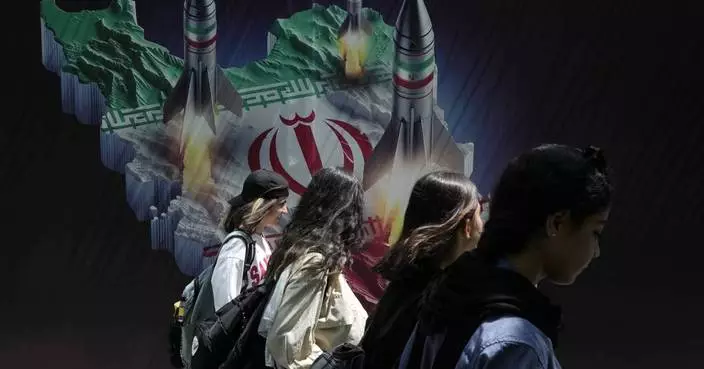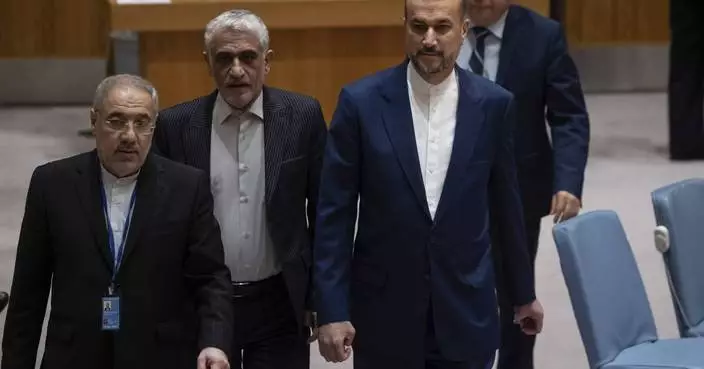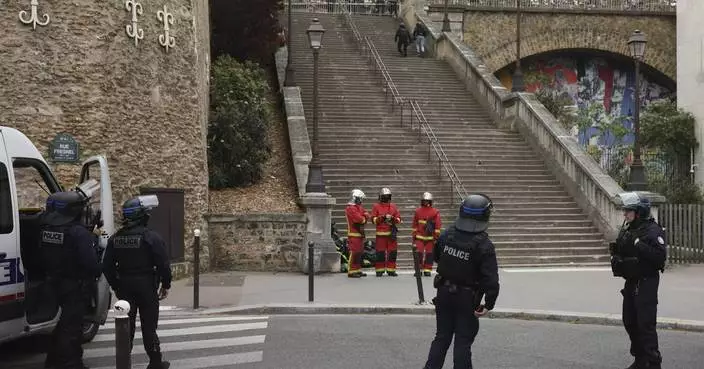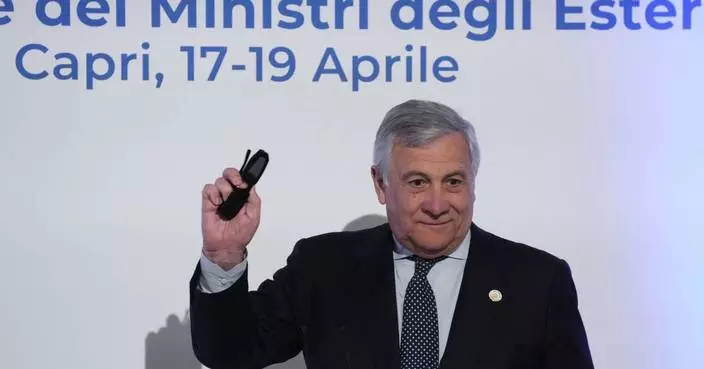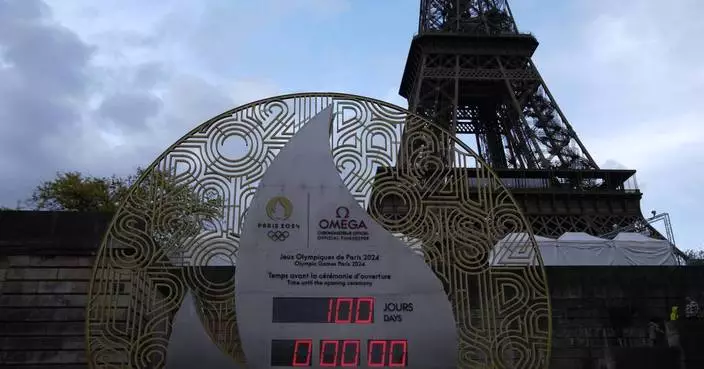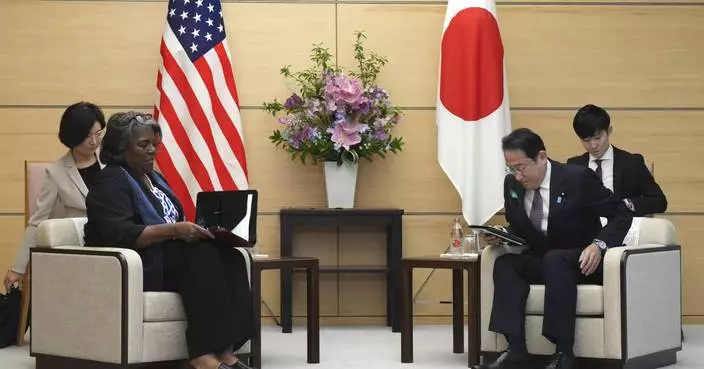Five world powers agreed with Iran on Friday to forge ahead with negotiations with the country and maintain its ability to export gas and oil as they seek to preserve a nuclear deal with Tehran despite the withdrawal of the United States.
European Union foreign policy chief Federica Mogherini told reporters that top diplomats from Germany, Britain, France, Russia and China reaffirmed their commitment to the 2015 deal, known as the Joint Comprehensive Plan of Action, "which is in the security interest of all."
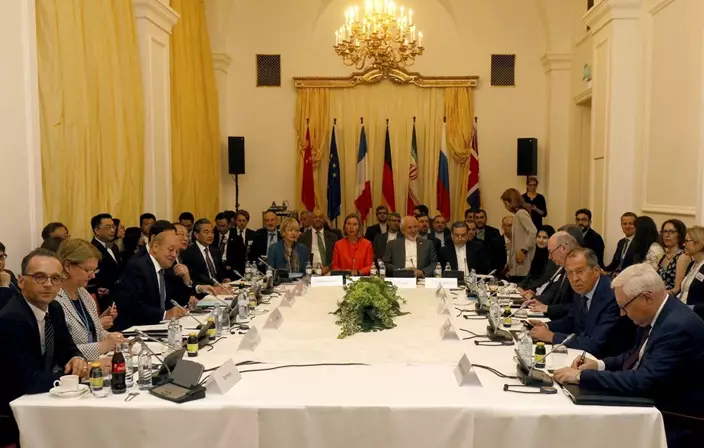
Delegates sit around a table prior to a bilateral meeting as part of the closed-door nuclear talks with Iran at a hotel in Vienna, Austria, Friday, July 6, 2018. (AP Photo/Ronald Zak)
"The participants recognized that, in return for the implementation by Iran of its nuclear-related commitments, the lifting of sanctions, including the economic dividends arising from it, constitutes an essential part of the JCPOA," Mogherini told reporters after the meeting without taking questions.
Iranian President Hassan Rouhani had previously called the latest package of incentives offered "disappointing," but Iranian Foreign Minister Javad Zarif said he would convey "deeper explanation" observed at the Vienna meeting to Tehran.
"We prefer to continue to stay in the nuclear deal," he told reporters. "But the final decision will be made in Tehran."
Still, he called the meeting "one step forward."
"The concerns, which we had last night and which were also expressed by President Rouhani, were addressed in the meeting and more details were disclosed, and they make us more optimistic than we were yesterday," he said.
"The EU package is a commitment, but we have to wait and see how it will be put into practice before the first sanction date" of August 6.
The JCPOA is meant to prevent Tehran from developing nuclear weapons, but U.S. President Donald Trump in May said he was unilaterally pulling out because he felt it wasn't strong enough and didn't cover other issues of concern to the U.S. and its allies, such as Iran's military influence in the Middle East and a ballistic missile program.
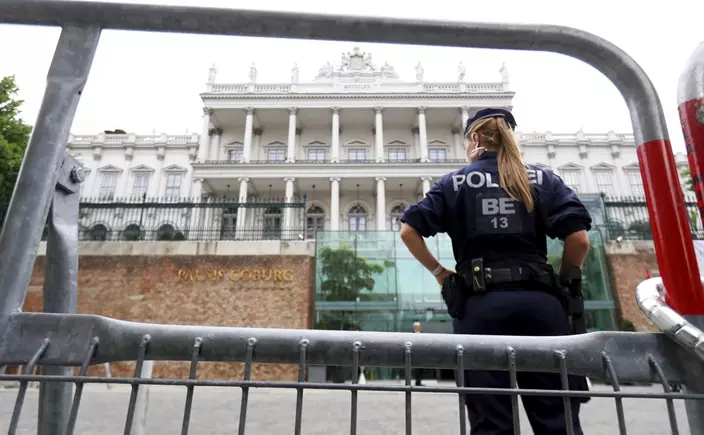
Police waits in front of Palais Coburg where closed-door nuclear talks with Iran take place in Vienna, Austria, Friday, July 6, 2018. (AP Photo/Ronald Zak)
Iran's economy is already suffering from the sanctions that Washington re-imposed after walking away from the nuclear agreement, and the U.S. has threatened to punish companies from other nations that continue doing business with Iran.
Ahead of the talks, Chinese Foreign Minister Wang Yi said preserving the deal was critical, and that the treaty states would send a "united, determined and strong signal" that they were committed to it despite Trump's decision.
"If this treaty can't be upheld then this doesn't just hurt the interests of Iran, it also damages the peace in the Middle East and the credibility of the international world order," Wang said.
Mogherini noted that companies pursuing business in Iran "have been acting in good faith based on the commitments contained in the JCPOA and endorsed at the highest level by the UN Security Council" and said the treaty states were committed to providing "clear and effective support for economic operators trading with Iran."
She didn't get into greater detail, but before the meeting German Foreign Minister Heiko Maas conceded that the treaty nations would not be able to compensate Iran entirely for the loss of business from companies withdrawing. But Maas said they would advise firms that want to continue investing and emphasize to Iran that leaving the deal "would have much greater disadvantages."
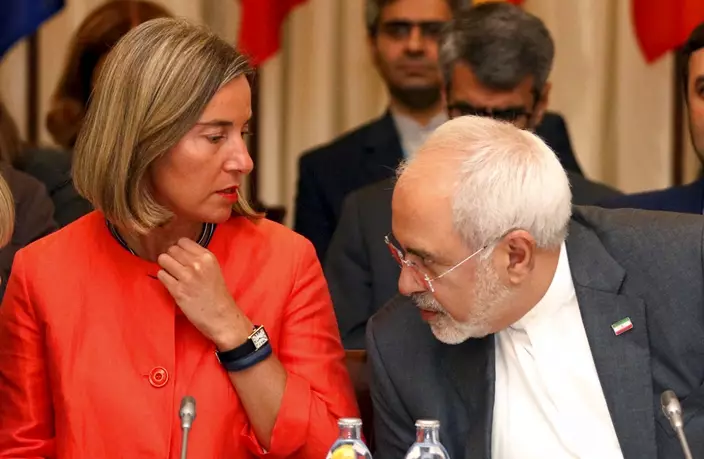
European Union High Representative for Foreign Affairs Federica Mogherini and Iranian Foreign Minister Mohammad Javad Zarif, from left, wait for the start of prior to a bilateral meeting as part of the closed-door nuclear talks with Iran at a hotel in Vienna, Austria, Friday, July 6, 2018. (AP Photo/Ronald Zak)
"We want to make it clear to Iran today that it still has economic benefits from this agreement," Maas told reporters. "Above all we will try to create the conditions for that."
Other objectives Mogherini outlined included maintaining wider economic relations with Iran, financial channels, Iran's export of oil and gas, and the continuation of sea, land, air and rail transportation links.
Mogherini said all participants had agreed to reconvene the JCPOA again at a later date.
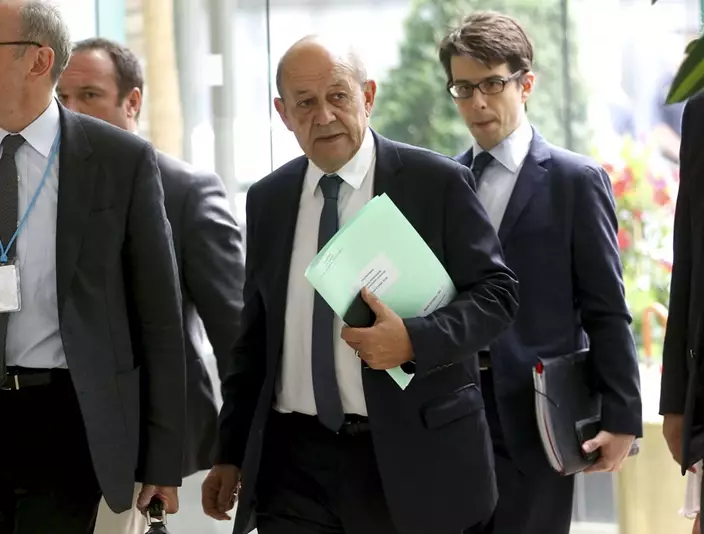
French Foreign Minister Jean-Yves Le Drian, center, arrives for a bilateral meeting as part of the closed-door nuclear talks with Iran at a hotel in Vienna, Austria, Friday, July 6, 2018. (AP Photo/Ronald Zak)
WASHINGTON (AP) — Israel demonstrated its military dominance over adversary Iran in its apparent precision strikes that hit near military and nuclear targets deep in the heart of the country, meeting little significant challenge from Iran's defenses and providing the world with new insights into both militaries' capabilities.
The international community, Israel and Iran all signaled hopes that Friday's airstrikes would end what has been a dangerous 19-day run of strikes and counterstrikes, a highly public test between two deep rivals that had previously stopped short of most direct confrontation.
The move into open fighting began April 1 with the suspected Israeli killing of Iranian generals at an Iranian diplomatic compound in Syria. That prompted Iran's retaliatory barrage last weekend of more than 300 missiles and drones that the U.S., Israel and regional and international partners helped bat down without significant damage in Israel. And then came Friday's apparent Israeli strike.
As all sides took stock, regional security experts predicted that Prime Minister Benjamin Netanyahu’s far-right government and the country's allies would emerge encouraged by the Israeli military’s superior performance. In response to international appeals, however, both Israel and Iran had appeared to be holding back their full military force throughout the more than two weeks of hostilities, aiming to send messages rather than escalate to a full-scale war.
Crucially, experts also cautioned that Iran had not brought into the main battle its greatest military advantage over Israel — Hezbollah and other Iran-allied armed groups in the region. Hezbollah in particular is capable of straining Israel’s ability to defend itself, especially in any multifront conflict.
Overall, “the big-picture lesson to take away is that unless Iran does absolutely everything at its disposal all at once, it is just the David, and not the Goliath, in this equation,” said Charles Lister, a senior fellow and longtime regional researcher at the Washington-based Middle East Institute.
Aside from those Iranian proxy forces, “the Israelis have every single advantage on every single military level,” Lister said.
In Friday’s attack, Iranian state television said the country's air defense batteries fired in several provinces following reports of drones. Iranian army commander Gen. Abdolrahim Mousavi said crews targeted several flying objects.
Lister said it appeared to have been a single mission by a small number of Israeli aircraft. After crossing Syrian airspace, it appears they fired only two or three Blue Sparrow air-to-surface missiles into Iran, most likely from a standoff position in the airspace of Iran's neighbor Iraq, he said.
Iran said its air defenses fired at a major air base near Isfahan. Isfahan also is home to sites associated with Iran’s nuclear program, including its underground Natanz enrichment site, which has been repeatedly targeted by suspected Israeli sabotage attacks.
Israel has not taken responsibility for either the April 1 or Friday strikes.
The Jewish Institute for National Security of America, a Washington-based center that promotes Israeli-U.S. security ties, quickly pointed out that Friday's small strike underscored that Israel could do much more damage “should it decide to launch a larger strike against Iran's nuclear facilities.”
Iran's barrage last weekend, by contrast, appears to have used up most of its 150 long-range ballistic missiles capable of reaching Israel, more than 1,000 miles (1,600 kilometers) away, said retired Gen. Frank McKenzie, former commander of the U.S. military's Central Command.
Especially given the distance involved and how easy it is for the U.S. and others to track missile deployments by overhead space sensors and regional radar, “it is hard for Iran to generate a bolt from the blue against Israel,” McKenzie said.
Israelis, for their part, have "shown that Israel can now hit Iran from its soil with missiles, maybe even drones,” said Alex Vatanka, director of the Iran program at the Middle East Institute.
Iran's performance Friday, meanwhile, may have raised doubts about its ability to defend against such an attack, Vatanka said. Iran is about 80 times the size of Israel and thus has much more territory to defend, he noted.
Plus, Israel demonstrated that it can rally support from powerful regional and international countries, both Arab and Western, to defend against Iran.
The U.S. led in helping Israel knock down Iran's missile and drone attack on April 13. Jordan and Gulf countries are believed to have lent varying degrees of assistance, including in sharing information about incoming strikes.
The two weeks of hostilities also provided the biggest showcase yet of the growing ability of Israel to work with Arab nations, its previous enemies, under the framework of U.S. Central Command, which oversees U.S. forces in the Middle East.
The U.S. under the Trump administration moved responsibility for its military coordination with Israel into Central Command, which already hosted U.S. military coordination with Arab countries. The Biden administration has worked to deepen the relationship.
But while the exchange of Israeli-Iran strikes revealed more about Iran's military abilities, Lebanon-based Hezbollah and other Iranian-allied armed groups in Iraq and Syria largely appeared to stay on the sidelines.
Hezbollah is one of the most powerful militaries in the region, with tens of thousands of experienced fighters and a massive weapons arsenal.
After an intense war between Israel and Hezbollah in 2006 that killed more than a thousand Lebanese civilians and dozens of Israeli civilians, both sides have held back from escalating to another full-scale conflict. But Israeli and Hezbollah militaries still routinely fire across each other's borders during the Israel-Hamas war in Gaza.
Hezbollah “is Iran's only remaining potential advantage in this whole broader equation,” Lister said.
Six months of fighting in Gaza have “completely stretched” Israel's military, he said. “If Hezbollah went all out and launched the vast majority of its rocket and missile arsenal at Israel, all at once, the Israelis would seriously struggle to deal with that.”
And in terms of ground forces, if Hezbollah suddenly opened a second front, the Israel Defense Forces “would be incapable at this point” of fighting full-on with both Hezbollah and Hamas, he said.
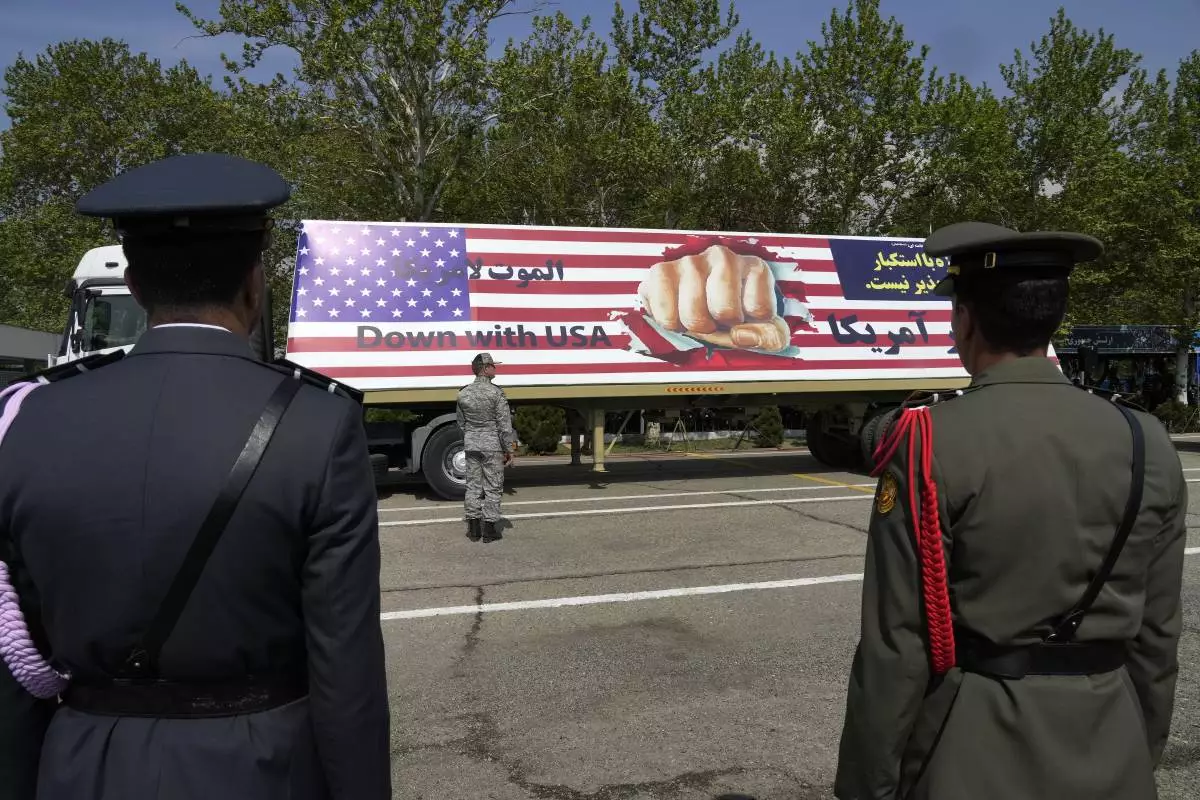
FILE - An anti-U.S. banner is carried on a truck during Army Day parade at a military base in northern Tehran, Iran, April 17, 2024. This month's unprecedented direct attacks between Iran and Israel are revealing deeper insights into both militaries. Experts say Friday's apparent precision strike by Israel deep into Iran demonstrated Israel's military dominance on almost all fronts. (AP Photo/Vahid Salemi, File)
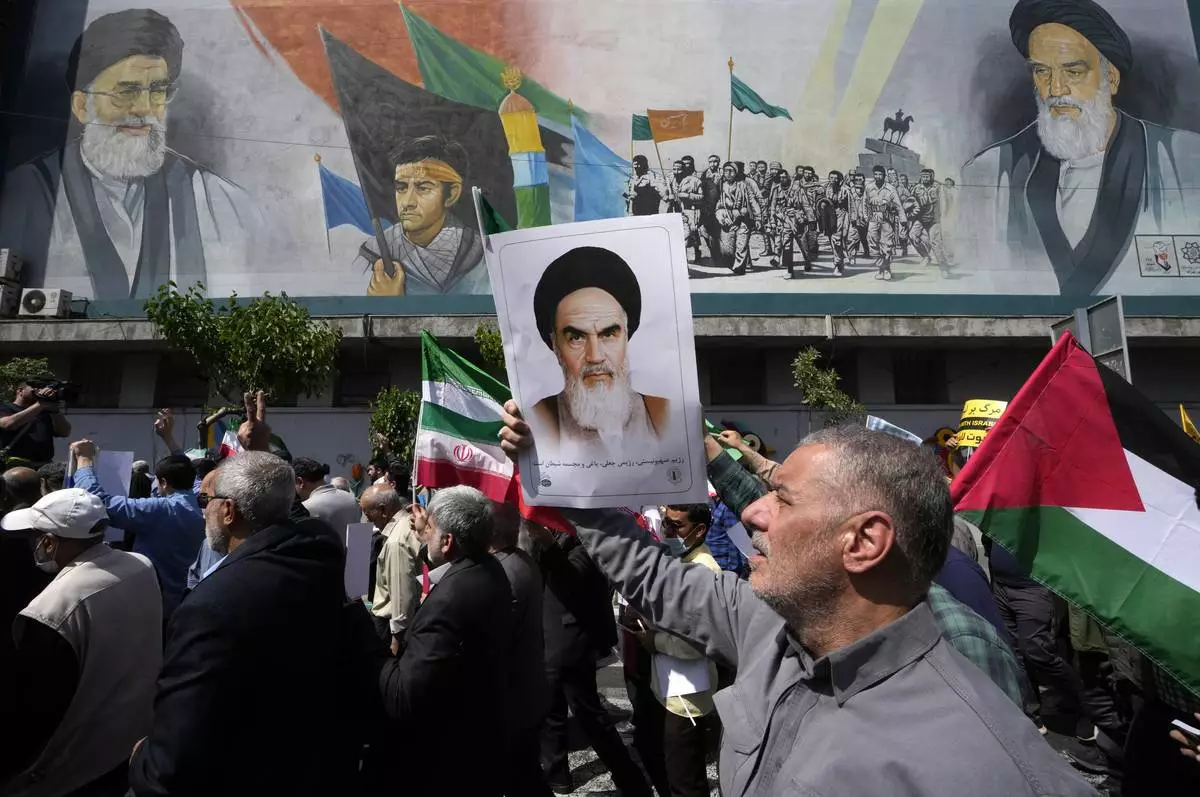
FILE - Iranian worshippers walk past a mural showing the late revolutionary founder Ayatollah Khomeini, right, Supreme Leader Ayatollah Ali Khamenei, left, and Basij paramilitary force, as they hold posters of Ayatollah Khomeini and Iranian and Palestinian flags in an anti-Israeli gathering after Friday prayers in Tehran, Iran, April 19, 2024. This month's unprecedented direct attacks between Iran and Israel are revealing deeper insights into both militaries. Experts say Friday's apparent precision strike by Israel deep into Iran demonstrated Israel's military dominance on almost all fronts. (AP Photo/Vahid Salemi, File)









